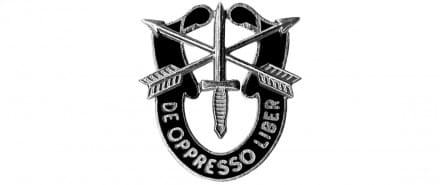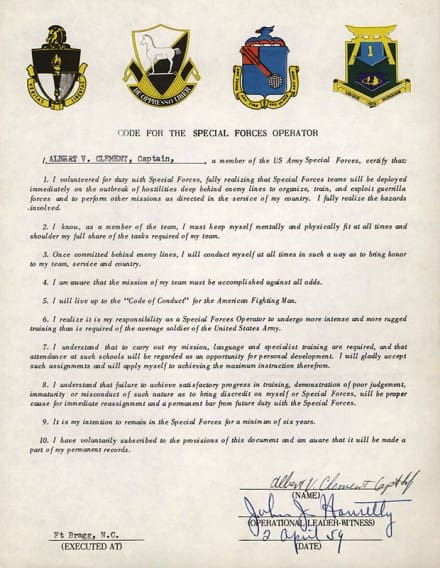Written by the US Army Special Operations Command Historian, this is a very interesting piece of Army Special Forces history which is sure to ruffle some feathers. I was certainly surprised by it, having always understood use of the moniker “Operator” began in the late 70s as a legal definition.

In the last fifteen to twenty years, the practice of calling a Special Forces (SF) soldier an ‘operator’ has caused considerable rancor within Army special mission units (SMU), the original of which adopted that appellation in the late 1970s. Today, all U.S. military service special operations forces and their higher headquarters apply that moniker to their sea, land, and air warfighters. Even staff personnel adopt that term for themselves. In the warfighter units this distinction clearly delineates and separates staff and support personnel from those assessed to undergo a mentally and physically tough selection course. Those that successfully achieve the rigorous standards must satisfy a leaders’ board to qualify for advanced training that could lead to operational assignments. In some SMUs psychological, physical, and mental assessments and re-evaluations are constant, hence the phrase, ‘Selection is an ongoing process.’ Regardless of the rigor applied by Special Operations Forces (SOF) elements, feelings of rancor in the ‘ranks’ of Army SOF towards the popular use of ‘operator’ are unwarranted.

Retired MAJ Albert Valentine ‘Jake’ Clement, Official Military Personnel Record (OMPR), National Personnel Records Center, St. Louis, MO.
SF did not misappropriate the appellation. Unbeknownst to most members of the ARSOF community, that moniker was adopted by Special Forces in the mid to late 1950s. SF-qualified officers and enlisted soldiers voluntarily subscribed to the provisions of the ‘Code of the Special Forces Operator’ and pledged themselves to its tenets by witnessed signature.
This document, signed by SF-qualified Infantry Captain (CPT) Albert V. ‘Jake’ Clement, an FA Team Leader [an Operational Detachment Alpha (ODA) today] in 1st Company, 77th Special Forces Group (SFG), and witnessed by John J. Hanretty on 2 April 1959, substantiates original ownership. According to Provision 10 of the SF Operator Code, the signed certificate was to be filed in one’s Official Military Personnel Records (OMPR). The original was found in the OMPR of retired Major (MAJ) ‘Jake’ Clement, second-in-command of the 10th SFG Congo Rescue Mission in 1960.
Cross-referencing sources is a standard practice of the USASOC History Office. It is critical to verify information in interviews, memoirs, and secondary source works. Primary documentation provides official, factual information to reinforce statements and/or disprove claims. Credibility is key to USASOC historical publications ‘standing the test of time.’ And, sometimes official records have surprises like the Special Forces Operator Code. It reinforced ‘silent professionalism.’ This document ought to stir memories of early SF veterans and reduce the angst among serving ‘special operators.’
by Charles H. Briscoe, PhD // charles.briscoe@socom.mil
First published in Veritas, Vol. 14, No. 1, 2018


I’ll be darned! I did not know that. Thanks for posting this piece of lost history, SSD.
TLB
No really, I’m an Operator. I’ve got this paper signed by Captain Albert that says so!
Mind-Blown!!!! I just prefer OAF personally. Lol
This would be the same USASOC Historian’s Office that is trying to deny the link between the OSS and SF?
Yes
Steve, SSD,
Damn, I as way out of the loop. How would that even be possible? I heard it straight from COL Banks’ mouth – not to mention any number of other histories – that SF was designed specifically to conduct precisely the same range of missions as the Jedburghs, OSS OperationaL Groups (OGs), and Det 101 in Burma. I guess I need to get ahold of Veritas more often.
TLB
This seems like an interesting footnote to SF history, but doesn’t seem in any way to diminish the 1970’s “legal definition” explanation cited by SSD (which I first recall reading in a memoir by an early unit member).
Thanks!
I love history, This is an awesome post. I constantly find people in certain communities that always want to rewrite it the way they want it, instead acknowledging the way it actually happened.
Thanks for this SSD.